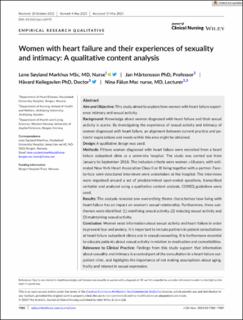| dc.contributor.author | Markhus, Lene Søyland | |
| dc.contributor.author | Mårtensson, Jan | |
| dc.contributor.author | Keilegavlen, Håvard | |
| dc.contributor.author | Fålun, Nina Britt | |
| dc.date.accessioned | 2024-01-24T07:12:54Z | |
| dc.date.available | 2024-01-24T07:12:54Z | |
| dc.date.created | 2023-06-26T10:01:54Z | |
| dc.date.issued | 2023 | |
| dc.identifier.citation | Journal of Clinical Nursing (JCN). 2023, . | en_US |
| dc.identifier.issn | 0962-1067 | |
| dc.identifier.uri | https://hdl.handle.net/11250/3113440 | |
| dc.description.abstract | Aim and Objective:
This study aimed to explore how women with heart failure experience intimacy and sexual activity.
Background:
Knowledge about women diagnosed with heart failure and their sexual activity is scarce. By investigating the experience of sexual activity and intimacy of women diagnosed with heart failure, an alignment between current practice and patients' expectations and needs within this area might be obtained.
Design:
A qualitative design was used.
Methods:
Fifteen women diagnosed with heart failure were recruited from a heart failure outpatient clinic at a university hospital. The study was carried out from January to September 2018. The inclusion criteria were women >18 years, with estimated New York Heart Association Class II or III living together with a partner. Face-to-face semi-structured interviews were undertaken at the hospital. The interviews were organised around a set of predetermined open-ended questions, transcribed verbatim and analysed using a qualitative content analysis. COREQ guidelines were used.
Results:
The analysis revealed one overarching theme characterises how living with heart failure has an impact on women's sexual relationship. Furthermore, three sub-themes were identified: (1) redefining sexual activity, (2) reducing sexual activity and (3) maintaining sexual activity.
Conclusion:
Women need information about sexual activity and heart failure in order to prevent fear and anxiety. It is important to include partners in patient consultations at heart failure outpatient clinics and in sexual counselling. It is furthermore essential to educate patients about sexual activity in relation to medication and comorbidities.
Relevance to Clinical Practice:
Findings from this study support that information about sexuality and intimacy is a central part of the consultation in a heart failure outpatient clinic, and highlights the importance of not making assumptions about aging, frailty and interest in sexual expression.
Patient Contribution:
Data were collected through face-to-face semi-structured interviews. | en_US |
| dc.language.iso | eng | en_US |
| dc.publisher | Wiley | en_US |
| dc.rights | Attribution-NonCommercial-NoDerivatives 4.0 Internasjonal | * |
| dc.rights.uri | http://creativecommons.org/licenses/by-nc-nd/4.0/deed.no | * |
| dc.title | Women with heart failure and their experiences of sexuality and intimacy: A qualitative content analysis | en_US |
| dc.type | Peer reviewed | en_US |
| dc.type | Journal article | en_US |
| dc.description.version | publishedVersion | en_US |
| dc.rights.holder | © 2023 The Authors | en_US |
| dc.source.pagenumber | 8 | en_US |
| dc.source.journal | Journal of Clinical Nursing (JCN) | en_US |
| dc.identifier.doi | 10.1111/jocn.16775 | |
| dc.identifier.cristin | 2157817 | |
| cristin.ispublished | true | |
| cristin.fulltext | original | |
| cristin.qualitycode | 2 | |

